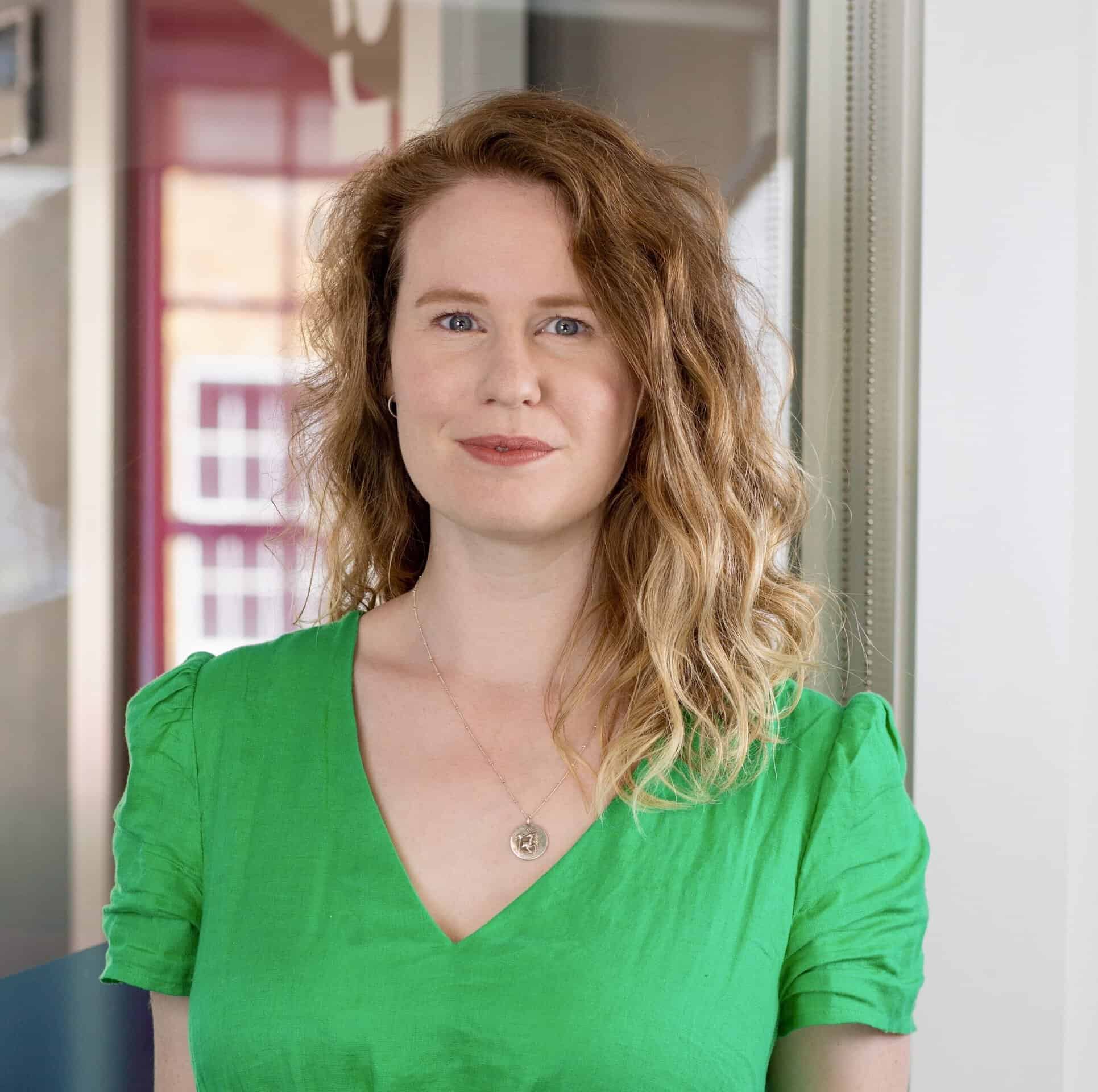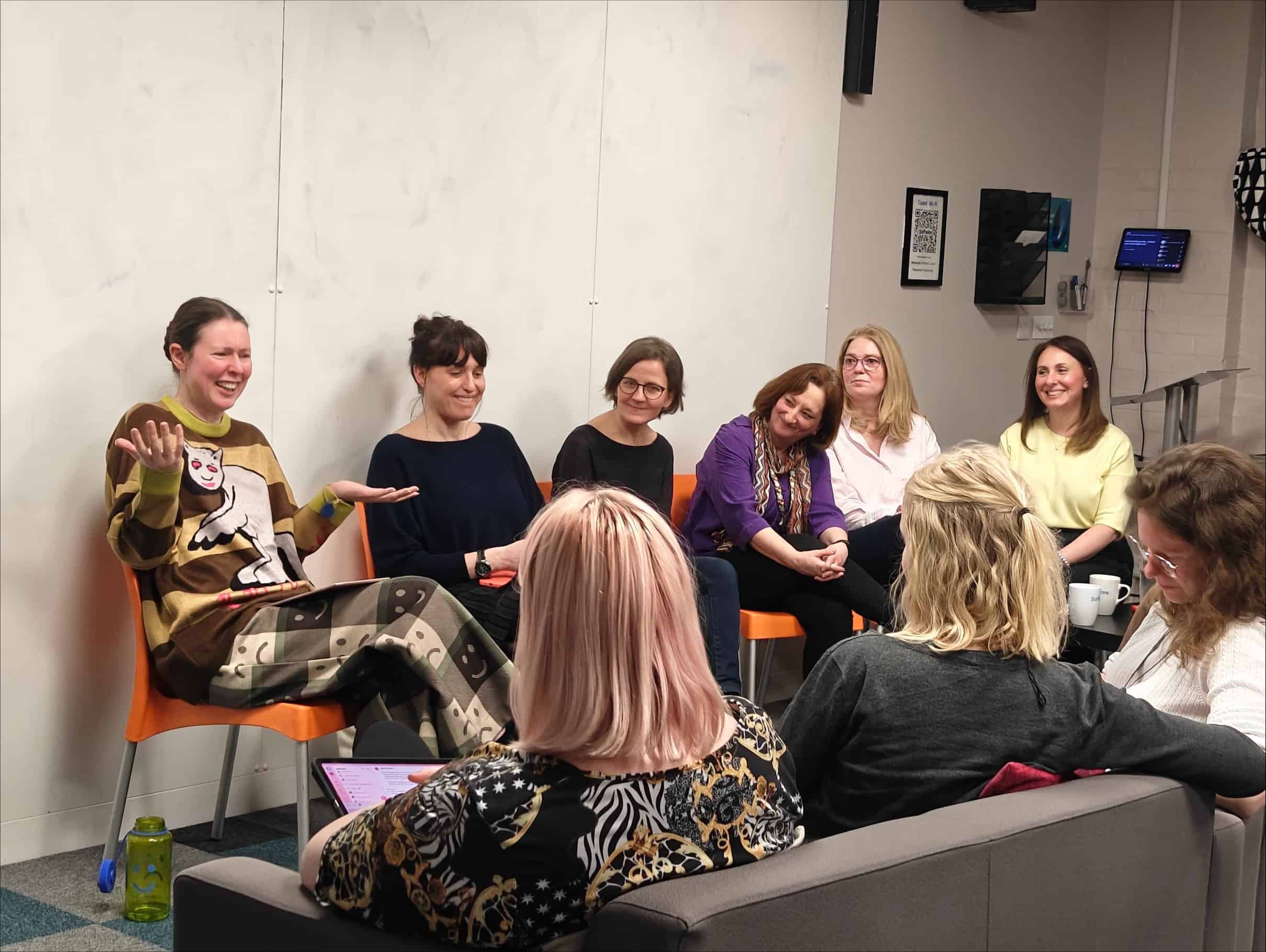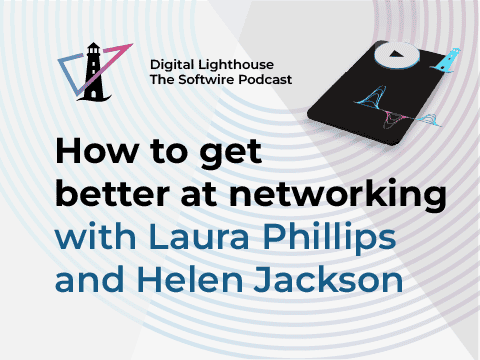“We spend a massive chunk of our lives at work. So who doesn’t want to come to the space where they feel comfortable and can bring their full selves?”
Esme Chant, D&I Lead and People Advisor at Softwire
It’s accepted knowledge that inclusive work environments create happier, healthier employees (and better work).
That doesn’t mean it’s easy or as prevalent as one would hope – especially when it comes to disabilities that aren’t always visible.
In this episode of The Digital Lighthouse, host Zoe Cunningham is rejoined by Sasha Burgoyne (Head of Academy Operations and co-founder of TechSwitch) and Esme Chant (D&I Lead and People Advisor at Softwire) to explore workplace inclusivity and disability support.
Join them as they discuss:
- Living and working with hypermobility spectrum disorder
- The challenges of disclosing disabilities in the workplace
- Practical workplace adjustments and accommodations
- Building support networks and peer communities
- The role of psychological safety in disability disclosure
- Strategies for employers to create inclusive environments
Sasha Burgoyne shares her personal experience living with hypermobility spectrum disorder and how workplace flexibility and accommodations have enabled her success at Softwire.
Esme Chant brings her expertise as DE&I Lead, discussing Softwire’s initiatives to support employees with disabilities and create a more inclusive workplace culture.
About our guests

Sasha Burgoyne
Head of Academy at Softwire, co-founder of TechSwitch.
Sasha Burgoyne is the co-founder of TechSwitch, an award-winning software development training programme for career switchers looking to move into tech, as well as people looking to return to the workplace. She is also Head of Academy at Softwire which delivers training in DevOps and software development and has been part of Softwire’s DEI Working Group since its inception. In between helping people break into the tech sector, Sasha spends a lot of time crocheting and playing video games.

Esme Chant
D&I Lead and a People Advisor at Softwire
Esme Chant is the D&I Lead and a People Advisor at Softwire. She has played a key role in enhancing inclusivity within the company by implementing practical solutions, such as neurodiversity awareness training, facilitating reasonable adjustments, and creating a D&I calendar to ensure that various identities are recognised and celebrated. Additionally, she actively works on programs aimed at improving inclusivity. In her free time, Esme enjoys travelling, running, and engaging in anything crafty.
Transcript
[00:00:01]
[Zoe Cunningham] Hello and welcome to The Digital Lighthouse. I’m Zoe Cunningham. On The Digital Lighthouse, we get inspiration from tech leaders to help us to shine a light through turbulent times. We believe that if you have a lighthouse, you can harness the power of the storm. Today, I’m really excited to have back on two guests we’ve had on before, which is Sasha Burgoyne and Esme Chant. For the benefit of the audience, can I ask you to introduce yourselves and tell us a bit about what you do at Softwire?
[00:00:35]
[Sasha Burgoyne] Yeah, sure. Hi, so I’m Sasha Burgoyne and I am Head of Academy Operations at Softwire and co-founded TechSwitch, which is our own kind of program that helps provide an accessible route into tech for people who don’t currently see themselves represented in the industry.
[00:00:49]
[Esme] And yep, I’m Esme and I work in the People and Culture team and sort of focus on our DE&I aspects here. One thing that we’re doing at the moment is try to progress from level one, a disability-confident employee, to level two.
[00:01:03]
[Zoe] Brilliant. We’re going to be talking about living and working with a disability. And I think I’d like to start much more broadly. Why is it important to Softwire to be an inclusive employer?
[00:01:14]
[Esme] I mean, there’s countless reasons why it’s important for Softwire to be an inclusive employer. For one, on an employee level, we spend most of our time at work. We spend a massive chunk of our lives at work. So who doesn’t want to come to the space where they feel comfortable and can bring their full selves? But also, there’s so many sorts of positives for the business, creating an inclusive environment. I mean, there’s been loads of studies that show that having a more diverse and inclusive environment, great productivity, innovation, creates better decision makers. So I mean, why wouldn’t we want to do this? I mean, it’s just a cycle, isn’t it? If we do this, we’re going to attract more talent. Maybe we’ll also get more clients as well. So I mean, it’s a no brainer.
[00:01:58]
[Zoe] Yeah, I just feel so similarly. It’s like we’re at work. And certainly for me, when I’ve been leading teams, like, who wouldn’t want to lead a team and have it be the most enjoyable place to work, right? And I think inclusivity is like a fundamental building block of that. Like it has to work for everyone. Okay, so we’re talking about being inclusive, which is very broad. And actually, there are a wide range of disabilities and long term conditions that employers can help with kind of if they know about it. So to be more specific, Sasha, could you tell us a bit about the condition you have that affects you, and how that affects your kind of workplace experience?
[00:02:43]
[Sasha] Yeah, sure. So I have something called hypermobility spectrum disorder, which you might also have heard of as kind of sister version of which is hypermobile Ehlers-Danlos syndrome. So both of them are connective tissue disorders. And basically, what that means is the bits of my body that glue it together, so like your ligaments, that sort of thing, they don’t really do that job. There is no glue. And that can manifest in a lot of different ways, often in my case, and other cases with things like joint laxity. So you can dislocate things really, really easily. You’re very stretchy, but that’s a bad thing. And that then means that what happens is your body is having to do all of that holding you together with your muscles, which is not what they’re supposed to do. So that can create fatigue, it can create a lot of pain a lot of the time, then you get various knock on effects from that, such as brain fog. Well, and depending on which parts of you are affected by that, because it can affect actually all your organs and everything as well.
So in my case, I also have astigmatism in my eyes. And a lot of people can have GI issues too. I’ve so far avoided that one. But you know, my day could be coming. And it’s really, really varied and difficult to know what it is that causes these things to flare up at any given time. In my case, what I basically just have to do is make exercise my hobby, because the more strong my muscles are, the more able they are to deal with, all of these things and to help stop my joints from popping out whenever they so choose. But there’s a lot of different modifications to my life, my lifestyle and my work that I have to do in order to, you know, just basically keep my life running. But that’s obviously only my experience with my condition. And it overlaps with a lot of other different ones.
There’s a lot of comorbidities as well. So quite often people will have POTS, which is postural orthostatic tachycardia syndrome, really rolls off the tongue, that can cause you to faint quite a lot. So I used to faint a lot, when I was a child, I have fainted multiple times on the tube. I’m very good at it now. So that is a bonus. I’m a real professional fainter. But there’s lots of different things around that. And anxiety and depression quite often can come along as well with any chronic health condition or disability. And it’s one of those things where people aren’t really sure whether it’s part of the condition or whether it’s a case of having a disability or a long term chronic health issue causes those to be more likely. But it is hard. It is hard to have something like this and to not be able to sometimes do the things you really want to do and have to make hard decisions. Like, okay, I really, really like to see my friend that I haven’t seen in years this evening. But if I go out, I don’t think I’m going to be able to work tomorrow. And, you know, you have to make difficult decisions like that all the time. And I think that’s the mental load that is put on people who have long-term health conditions and disabilities is hard to imagine until you have one, I think. And yeah, you just don’t think about that aspect of it.
[00:05:03]
[Zoe] I think it’s really interesting, like listening, because you’re kind of talking a lot about the different decisions that you have to make. And the different ways it affects your life. And actually, that’s kind of quite good for demonstrating. There are a lot of ways that your employer can actually help make that better, right? If they choose to engage with it.
[00:05:45]
[Sasha] Yeah, absolutely. And I mean, you know, one of the things I value massively about Softwire is the flexibility that I have, because it does mean on days when I have a flare up, potentially, I can, you know, even just coming in half an hour later can make a huge, huge difference to me, because it means I’m less stressed about it. I know that I can tell my team if I’m having a difficult day. And particularly with all of these things, the unpredictability is the real issue. So knowing that you have an employer that you can say, I’m having a really bad day, like I can’t think, I don’t know what’s going on, or just saying, sorry, can we just push this meeting back because I’m struggling is really, really helpful.
And similarly, as I said, exercise has to be my hobby. So something that’s really important for me is I go to the gym three times a week at lunchtime. And sometimes I have to, in fact, actually, I was recording this podcast. I think we were going to have a meeting about it. And I was like, I’m so sorry. That’s my gym time. I can’t have it over lunch, because that’s my gym time. So being able to feel like I can say that is so important. And I think often there are lots and lots of different adjustments and things that workplaces can give you. So I also have a very fancy chair, which is excellent. I have a sit-stand desk that is a automatic one, because sometimes I can’t lift things very well. So the ones that you do manually, my wrists can’t handle a lot of the time. So I have my little motorized one. And I have quite regular workplace assessments to make sure that I’m not causing my condition to get any worse by having anything set up in the way that I have it. And that changes quite a lot.
So last year, all of a sudden, the mouse that I’ve been using for years, horrible, hate it, that had to go. So now I have a track pad instead. And in a couple of years’ time, that might have to change too. And I think just having that ability to be open and honest with your employer about the adjustments that you need is so useful. It’s so empowering as well, because it does make me feel like I’m not the problem. My health is the problem, but that’s a separate to me specifically. And I think that’s really nice.
[00:07:39]
[Zoe] Yeah. And that really makes me think, like, on the employer side, so many of the things you said there are so small and simple to put in place, but it can only be done if you’re prepared to disclose quite personal details about what you’re going through. So maybe, Esme, on the employer side, can you tell us a bit about why it’s such a problem for employers when employees don’t disclose disabilities in the workplace?
[00:08:07]
[Esme] Yeah, obviously it creates challenges if an employee doesn’t feel comfortable to disclose because then the employer isn’t aware of like accommodations that could be made to support that employee. And then, you know, that will lead to barriers for that employee. It could potentially affect how they do their job, which is just a real loss of opportunity because they might not, you know, be able to work to their full potential. So it’s, you know, a negative on the employee and the employer.
But obviously, like you said, it’s sensitive information that they’re given here. And I think we’re still in the process of getting people comfortable about sharing this information because I know previously it might have had negative effects within the workplace. And I mean, the Talent Tech Charter report this year showed the disparity about this. So like reported that 3% of tech workers identified as neurodivergent to their employees. But then when asked directly, that rose to 53%. So it just shows there’s a lot more that we need to do to make people feel psychologically safe to share that information. So I think we’re doing quite a good job at Softwire, hopefully trying to help with this. But I just think there’s a lot more to be done to get people comfortable. But I would say best practice for employees. If you notice that an employee is struggling and they haven’t disclosed, but maybe you think. They might be neurodivergent or have an invisible disability. There’s nothing stopping you as an employer for in-adjustments in place and having a conversation, see what things can be done to help them thrive at work. So you shouldn’t let that stop you trying to support your employees if you notice they’re struggling.
[00:09:44]
[Zoe] Yeah, because you can be delicate about it, but you could just say, oh, I wondered if we happen to have this type of desk available, would that be helpful to you?
[00:09:52]
[Esme] Exactly. Or for instance, say you notice an employee is in a workplace that’s quite noisy and they seem quite sensitive to the noise. Well, a simple thing is maybe offering noise cancelling headphones or you can get earbuds. So, yeah, it’s been a bit of an inattentive employer as well. So you can pick up on these things because sometimes people haven’t got a diagnosis as well. So it’s just creating an environment where people can do their best.
[00:10:18]
[Zoe] Yeah, it’s so important. And it’s much easier when we’re in a position where employers really care and show they care. And so employees can be open and say, this is what’s affecting me. Let’s work out how we can make it better. But maybe Sasha, like you might be in quite a good position to share, what are some of the reasons why employees might not want to disclose a disability?
[00:10:41]
[Sasha] Yeah. So, I mean, even at Softwire, it was kind of scary for me to disclose that I have a condition because I think a lot of the time you do worry as an employee about the stigma that comes with it. So, you know, particularly me saying things like sometimes I get really bad fatigue or sometimes I get brain fog. And that being something that an employer might look at and go, yeah, that might mean she’s going to be unreliable or, you know, she might forget things or drop things. That is scary to me as an employee is to think that maybe that could impact my career. It could impact my career progression.
People might think we won’t give her this really important thing because what if she’s ill throughout that? And I think that’s a really difficult hurdle to overcome. And it’s something I’ve basically overcome by just talking about it as often as I possibly can. So I was like at this point, if you don’t know, then I’m impressed because I have found that it has been really useful. But I have also in my little corner of Softwire created a team that is very flexible and able to accommodate whatever. You know, everyone needs, because actually at the end of the day, the more flexible, and the more understanding we are benefits everyone, because the kind of adjustments that I need aren’t actually that far of someone, who might be returning after having a family or like, you know, if you’ve got care responsibilities for an elderly relative, or if you’ve just broken your foot, because you trip down the stairs and you need like various different adjustments around that because, you know, that sort of thing is a temporary disability. And it’s really fascinating to me how we’re much more willing to talk about that sort of thing and the adjustments that someone would need because, say, you’ve broken your foot. Suddenly everyone is actually much more willing to help with that. And you would never not disclose that to your employer. You’d be like, I’ve broken my foot. I’ve worn crutches or I need these things. And really disabilities should be treated the same.
That said, not everywhere is as accepting as Softwire. And definitely there is still a lot of stigma around it. And particularly for people who have invisible disabilities, there is sometimes that sort of disbelief around it where it’s like, are you just being lazy? Are you just wanting the seat on this bus because you want a nice sit down? And that’s really, really hard. But then equally for people with very visible disabilities who use mobility aids, they get a lot of stigma as well. And they, you know, have a lot of unpleasant interactions with people. It’s a really, really difficult kind of sensitive topic.
And so I feel for anyone who chooses either way, really chooses to disclose it or not, because there are inevitably difficulties that you’re going to come up against whichever way you choose. So it’s a little bit of a kind of lose-lose situation. But there are pros to both as well. And I think for me personally, I found disclosing it has been really, really helpful. But I think a huge part of that, as I said, is where I am. I feel able to do that. And even at times when it has been very scary to admit that, like, I’m really struggling with things, knowing that there is a supportive environment around me has just been so, so helpful. And yeah, very thankful to Softwire for.
[00:13:38]
[Zoe] And some of that comes from peers as well as just from management, right? I think there’s a peer network that you’re part of.
[00:13:45]
[Sasha] Yeah, so we have a little group in Softwire, which is a sort of private Slack channel where everyone comes into it and you don’t have to, but most people have by this point. You post like a little blurb about what your condition is and how it affects you at work or in life in general. And it’s just a really nice space to be able to sometimes have a little vent about how something has been affecting you. And that’s not always work related. Like sometimes it can be, I’m really struggling to get a GP appointment, which like, oh my goodness, it is a nightmare. Or I’m struggling to get a diagnosis. I’ve had like three different diagnoses. Even I’ve been, I went through multiple diagnoses before I got to mine. And like, realistically, I should have been diagnosed with this when I was 12. And instead I was diagnosed with it when I was 28, 29. So like it takes a really, really long time and having a space where you can openly talk about those struggles and those difficulties is really nice.
But also just share some chronic illness memes that we all quite enjoy. Makes you feel less alone and kind of like more people in the world experience it the way that you do. And that’s just really nice. And actually, it also is really good for recommendations because sometimes someone will have had some issue. Like I have an osteopath for my hypermobility. And if someone pops up and is like, oh, hey, I need, I’ve got hypermobility. Like, what would you recommend? I would be like this person, try this person out. And equally, I even found out something about my own condition that I didn’t know from someone on the group. Because yeah, they were like, oh yeah, recurrent infections. That’s a symptom of this. And I was like, oh, that does make a lot of sense. And so yeah, it’s a really wonderful, like learning and sort of community experience that does just help you feel less alone and less like you’re sort of screaming into the void sometimes.
[00:15:22]
[Zoe] I think that point about sharing experiences and learning from others is really important for everyone. I think what would be really nice is Esme, you may be able to share some of the specific things that we do at Softwire. And anyone listening, any things you do in your organization that you can share back with us, tweet us like at Softwire UK and tell us what you do, because I do think there’s so much to be learned just from going, oh, that’s a great idea. That’s a great idea.
[00:15:52]
[Esme] Yeah, please do share because we’re always up bettering our employee experience. But one thing that we’ve spoken about is creating that psychological safety. So doing awareness chats. So we did a one on dyslexia last month for Neurodiversity Celebration Week. And actually, the lovely Sasha next month is doing one on hypermobility and sharing sort of like her story and her tools on how she copes in the workplace is just trying to create that space where people are learning and, you know, the walls are lowering to make people feel comfortable. But also what’s important is that we’re like equipping our line managers to be able to support neurodiverse or disabled employees.
So in December, we introduced neurodiversity awareness training for our LMs. So that’s now part of the training program. And it was really successful. I mean, the lessons learned from it are things that are just like maybe just general for good practice generally, but it’s given line managers like the tools really to support these employees and create inclusive teams and also be able to have those conversations, open up those conversations in a sort of a safe and comfortable way. So actually, we’ve got our next cohort are going to be doing that training in June with Neurobox, who we partnered with, and they’ve been great. So I definitely recommend them as a tool. They’ve been a really great partnership but also, you know, something that we’ve been using more of recent years is, someone comes to us with a condition that we actually don’t know what kind of adjustments we can make. We’ve been leaning on the support of workplace assessments needs assessments. So again, we’ve been using Neurobox. And they’ll do an assessment with that employee, and then they’ll give them tailored support options and things that we can introduce at work, and that might be sort of adjustments, like equipment adjustments, but it also could be recommendations on sort of like workplace coaching as well. So that has been really helpful. And another tool, which is something we’ve been using is the Access to Work wants. So this is a government scheme that we encourage employees to sign up to if we feel that they could benefit from additional support. But also we’ve had employees sign up themselves. And yeah, they again, provide you with suggestions on how to ensure that the employees got the tools to be able to do their job properly.
[00:18:15]
Zoe: Brilliant. And providing it on an individualised basis rather than just a, here’s some things, which one of these fits you? It’s actually looking at what’s affecting the individual.
[00:18:25]
[Esme] Yeah, tailoring it to that specific individual because everyone’s needs are different. So yeah, check out Neurobox. So we’ve built a really good relationship with them. I highly recommend it if you’re looking for support as a company.
[00:18:36]
[Zoe] Fantastic. Just to finish, Sasha, because I think it’s a very challenging and can be a very lonely experience if you’re diagnosed with a condition. What kind of support groups and organisations are available?
[00:18:50]
[Sasha] Yeah, so there’s lots of different ones depending on what you’re diagnosed with. And it will vary depending on how common it is as well. So for some much more common things, there can be multiple groups. You might even have groups in your area that you can go and do meetups with. Or yeah, various different kinds of support. Some places like Age UK, interestingly, don’t just do things for older people.
Actually, they will provide support for people with disabilities and long-term health conditions as well. So check out things like that. For rarer conditions like mine, we still have a charity that has a lot of information about what condition is, it can be more challenging if what you have is rarer. Because like, for example, I did an article, I think last year, and the person who was interviewing me about it said, oh yeah, I looked up your condition and the NHS page on it is very short. There was basically nothing on it. And I was like, yeah, I know. So there can be less information. But actually looking often at the more general symptoms that you have can be quite helpful. So for example, if you do have GI issues, there’s Guts UK who can be really helpful and can talk to you about things like that.
Like I said, Age UK can help you with things like, getting you a new mattress, which as someone who has dislocated multiple ribs from having the wrong mattress, is really useful, really, really handy. So things like that, just ask around and also talk to other people who have disabilities. Because even if they’re not the same as yours, often they’ll be like, oh, I know someone who can help with that. Or this organisation really helped me with this specific thing. There’s like free mental health support in London that you could get, which I cannot remember the name of right now, but we can probably pop a link to it somewhere. There’s a lot of tools out there. It does often just take a little digging around in order to find them. But yeah, trying to go about it almost by symptom rather than condition can be quite helpful if you’ve got one of the more unusual conditions like me.
[00:20:33]
[Zoe] Well, what a great place to finish. Thank you so much, Sasha and Esme.
[00:21:02]
[Sasha] Thanks for you so much, Zoe.
[00:21:03 Esme] Cheers.



